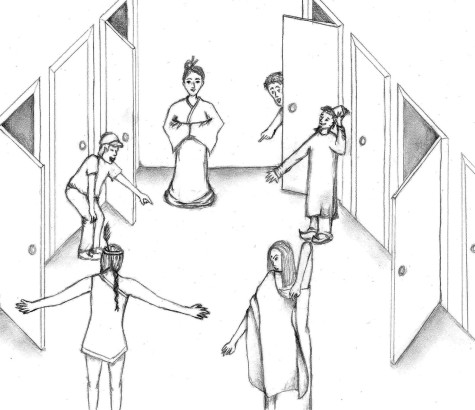Culture is not a costume

Recently, I discovered an image of a new costume being sold at Halloween stores. It wasn’t of a woman in a minion costume or a scandalous outfit, but a burly man in a costume mocking Caitlyn Jenner’s iconic “coming out” Vanity Fair front-page photo. The look is complete with a blonde wig and a sash that reads “Call Me Caitlyn.” By wearing this for Halloween, people may think they’re being trendy and satirical, but they’re actually only perpetuating transphobia.
The lifestyle of transgender people are not costumes, and the culture of an oppressed minority is not a punchline. This Caitlyn Jenner costume is one of many costumes which trivialize and accessorize the struggles of other cultures and groups.
I’ve noticed a trend of people hiding their prejudice under the guise of comedy and play. For example, at Halloween, some people dress up as “Mexicans” with a sombrero and poncho because “it’s funny.” The problem with dressing up with garments from another culture is that by doing so they are either stereotyping others or appropriating their culture.
When people choose to imitate the culture of another person for comedic purposes, that is stereotyping. This is blatantly ignorant because what they are doing is perpetuating an image of a group that is disrespectful. People can have funny costumes without being racist or prejudiced. Just don’t dress up and mock another culture.
In other cases, people want to look foreign and cool for Halloween, and they dress up as a person from another culture. This is called cultural appropriation and it extends outside of Halloween. Cultural appropriation happens when members of a dominant culture take elements from a culture of people who have been systematically oppressed by that dominant group. For example, some white people wear native headdresses and mark their faces with paint and completely ignore the rich history behind it. This history includes the fact that their ancestors were responsible for the genocide of the people from whom they are borrowing the cultural objects and that those people are still being treated harshly today.
This isn’t a mere cultural exchange in which people have mutual respect for each other and are learning about different cultures in a respectful way. People are treating these cultures like disposable objects that they can use for a day and then take off and forget about. It makes the statement that minority races and cultures are simply accessories with which you can adorn yourself, completely unaware of the deep cultural significance behind them. This is another type of colonization that has taken course throughout history, when people are taking from an oppressed group only for its exotic features and not for what it really is.
So for this upcoming Halloween, I urge that everyone not fall into the cultural appropriation and stereotyping when choosing costumes. At the end of the day, you can get out of your costume and resume your life, but others will have to face the racism and stereotyping that your costume helped sustain.

